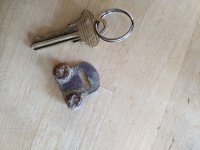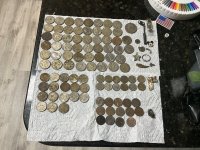Moegano534
Jr. Member
- May 10, 2014
- 21
- 12
- Detector(s) used
- Whites MXT, Dowsing/Divining rods
- Primary Interest:
- All Treasure Hunting
Hello All,
Do gold coins generally settle deeper in the ground compared to silver and copper coins because of golds higher weight/mass?
What is your deepest coin find that you think was dropped on the ground( 6", 12", 3 ft, etc??)
I have just bought a bigger coil that will go a lot deeper than my stock coil and I hunt a "pounded out" site where an old town used to be (it is now just a large plowed field with no signs that it was ever a town.)
My hope is that I will be detecting in a deeper soil layer than previous detectorists. All info and opinions are greatly appreciated.
Thanks!!!
Do gold coins generally settle deeper in the ground compared to silver and copper coins because of golds higher weight/mass?
What is your deepest coin find that you think was dropped on the ground( 6", 12", 3 ft, etc??)
I have just bought a bigger coil that will go a lot deeper than my stock coil and I hunt a "pounded out" site where an old town used to be (it is now just a large plowed field with no signs that it was ever a town.)
My hope is that I will be detecting in a deeper soil layer than previous detectorists. All info and opinions are greatly appreciated.
Thanks!!!






